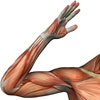Getting a degree and inspiring a foundation
Murdoch University graduate Conor Murphy has not let Duchenne Muscular Dystrophy (DMD) stand in the way of earning a double degree in Politics and History.
DMD sees muscles deteriorate over time due to the under-production of the protein dystrophin. The rare disease stems from a genetic mutation and only affects males.
According to his mother, Lesley Murphy, Conor was first diagnosed at the age of three-and-a-half and was confined to a wheelchair by ten. At 15, he required assistance with feeding, and by his final year at university, Conor was left with only the use of his fingertips.
Despite these challenges, Conor found strategies to keep studying.
“The biggest challenge was developing new ways to get around limitations which were constantly changing and gradually getting worse. For example, I had to develop my memory skills to remember things I wasn‟t able to write down in time, as it took me longer to write, and eventually I couldn‟t write at all,” Conor said.
Conor credits Murdoch University for offering support, including flexible exam arrangements, funding arrangements for support workers, good accessibility and providing a special room in the library with technical aids for study.
While he concedes he felt like giving up at times, the desire to achieve something he could be proud of later in life kept him going.
“I wanted to prove my worth as a member of society. I was also conscious of being a trailblazer for others with a similar disability to show younger guys that life doesn’t end at diagnosis,” Conor said.
This spirit has helped inspire the formation of Rare Voices Australia (RVA), which hopes to become the peak body for ‘rare diseases’ nationwide. Recently registered as a not-for-profit, the organisation is focussed on representing those suffering from the estimated 7000 – 8000 conditions that comprise ‘rare diseases’.
According to Mrs Murphy, a co-founder, the organisation’s first community consultation took place on September 13 in Sydney.
“We need to hear what people want us to do, so we can go out and act for them. If they want us to lobby for increased therapies, access to international drug trials or push for research, that’s what we plan to do,” she said.
Mrs Murphy has also recently joined Murdoch’s Centre for Comparative Genomics (CCG) as an Adjunct Research Associate, bringing a ‘human face’ to CCG’s support of genetic research.
CCG Director Professor Matthew Bellgard said his Centre has been designing a robust, web-based framework to help with the creation and ongoing curation of databases for all rare diseases.
“Our goal is to provide a way for as much information as possible to be integrated together – disease types, locations, prevalence, symptoms – to improve clinical diagnoses and inform drug and gene research,” Professor Bellgard said.
“Hopefully our expertise can help researchers fast-track ways to translate gene therapies not just for a given disease but also across conditions – though we know that’s going to take time and support.”
(Source: Murdoch University)
More information
 | For more information on neurological disorders that affect movement, and their treatments, see Neurological Rehabilitation and Movement Disorders. |
Dates
Created by:

 Login
Login














